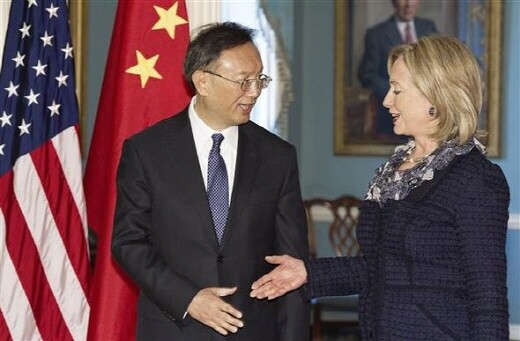hankyoreh
Links to other country sites 다른 나라 사이트 링크
N.Korea steps up dialogue offensive

Son Won-je, Staff Writer
Since the beginning of 2011, North Korea has been using various means to wage a dialogue offensive. Following a New Year’s joint editorial urging “resolution to inter-Korean antagonism,” a “government-party-group combined statement” was issued Wednesday with a proposal for a halt to mutual aspersions and holding unconditional talks between North Korean and South Korean authorities.
A number of analysts have stated that the series of North Korean proposals for inter-Korean dialogue are a move to serve two purposes. They include the diplomatic goal of forming an atmosphere conducive to resuming the six-party talks on the nuclear issue and the domestic goal of establishing a succession framework through improved inter-Korean relations.
The combined statement Wednesday emerged at a time when the U.S. has made clear that improvement in inter-Korean relations must be a priority if the six-party talks are to resume. In essence, Pyongyang used the statement to send the message to the United States that it is working to improve its relations with South Korea. With a U.S.-China summit meeting scheduled to take place in Washington on Jan. 19, the move also helped China to save face following its calls to both North Korea and South Korea for stabilization of the political situation on the Korean Peninsula and the improvement of inter-Korean relations. Analysts say that another goal was the diplomatic effect of diluting the warmonger image earned through the shelling of Yeonpyeong Island last year by making a preemptive overture for dialogue.
Improved relations with Seoul are also necessary for the stability of the succession to power of Kim Jong-un. Establishing this system quickly will require improvements in public welfare through stable economic growth, an area that in turn requires political stability and aid from South Korea.
“Now that they have solidified popular opinion through provocations against South Korea, they are trying to come up with a way of improving inter-Korean relations in order to resolve their economic problems,” Korea National Defense University Professor Kim Yeon-soo said Thursday.
North Korea’s dialogue overtures came through the roundabout means of a “combined statement” rather than a direct proposal from Pyongyang authorities. They did not contain any expression of regret for the sinking of the Cheonan or the attack on Yeonpyeong Island, as Seoul has been demanding. Analysts say that in so doing, Pyongyang opened up the possibility of a retreat due to its uncertainty over whether the response from South Korea would be favorable.
“It means that if Seoul does not accept, they may incite conflict within South Korea through contacts at the private level and with opposition parties, and pin responsibility for the suspension of dialogue on the South Korean government,” said Kim Yeon-soo.
Seoul now finds itself in an awkward position. It is concerned that accepting the proposal would give the appearance of being dragged around, while rejecting the proposal may leave it being blamed for strained relations with North Korea.
Some observers have said that the right answer would be for Seoul to boldly accept the proposal for dialogue. Noting that the combined statement refers to “discussing and resolving all issues of great importance related to the Korean people, including detente, peace, reconciliation, and cooperative endeavors through dialogue, negotiations, and meetings,” observers say that the best approach would be to meet and bring up the Cheonan and Yeonpyeong Island issues.
“Now is the time for Seoul to directly verify Pyongyang’s position by proposing ‘preliminary meetings for special envoy talks’ or ‘preliminary meetings for minister-level talks,’” said Jung Sung-jang, a senior researcher at the Sejong Institute.
Song Min-soon, a Democratic Party lawmaker and former foreign minister, said, “I hope that as ‘issues of great importance related to the Korean people,’ as Pyongyang put it, [Seoul] makes a counterproposal to discuss things like apologies for the Cheonan and the Yeonpyeong Island attack, a promise that these things will not happen again, the North Korean nuclear issue, separated families, and human rights issues such as South Korean POWs and abductees.”
Please direct questions or comments to [englishhani@hani.co.kr]
Editorial・opinion
![[Editorial] Does Yoon think the Korean public is wrong? [Editorial] Does Yoon think the Korean public is wrong?](https://flexible.img.hani.co.kr/flexible/normal/500/300/imgdb/original/2024/0417/8517133419684774.jpg) [Editorial] Does Yoon think the Korean public is wrong?
[Editorial] Does Yoon think the Korean public is wrong?![[Editorial] As it bolsters its alliance with US, Japan must be accountable for past [Editorial] As it bolsters its alliance with US, Japan must be accountable for past](https://flexible.img.hani.co.kr/flexible/normal/500/300/imgdb/original/2024/0417/6817133413968321.jpg) [Editorial] As it bolsters its alliance with US, Japan must be accountable for past
[Editorial] As it bolsters its alliance with US, Japan must be accountable for past- [Guest essay] Amending the Constitution is Yoon’s key to leaving office in public’s good graces
- [Editorial] 10 years on, lessons of Sewol tragedy must never be forgotten
- [Column] A death blow to Korea’s prosecutor politics
- [Correspondent’s column] The US and the end of Japanese pacifism
- [Guest essay] How Korea turned its trainee doctors into monsters
- [Guest essay] As someone who helped forge Seoul-Moscow ties, their status today troubles me
- [Editorial] Koreans sent a loud and clear message to Yoon
- [Column] In Korea’s midterm elections, it’s time for accountability
Most viewed articles
- 1[Column] The clock is ticking for Korea’s first lady
- 2Samsung barricades office as unionized workers strike for better conditions
- 3[Editorial] When the choice is kids or career, Korea will never overcome birth rate woes
- 4Why Israel isn’t hitting Iran with immediate retaliation
- 5[News analysis] After elections, prosecutorial reform will likely make legislative agenda
- 6[Editorial] Does Yoon think the Korean public is wrong?
- 7S. Korea, Japan reaffirm commitment to strengthening trilateral ties with US
- 8[Editorial] As it bolsters its alliance with US, Japan must be accountable for past
- 9Japan officially says compensation of Korean forced laborers isn’t its responsibility
- 10Faith in the power of memory: Why these teens carry yellow ribbons for Sewol